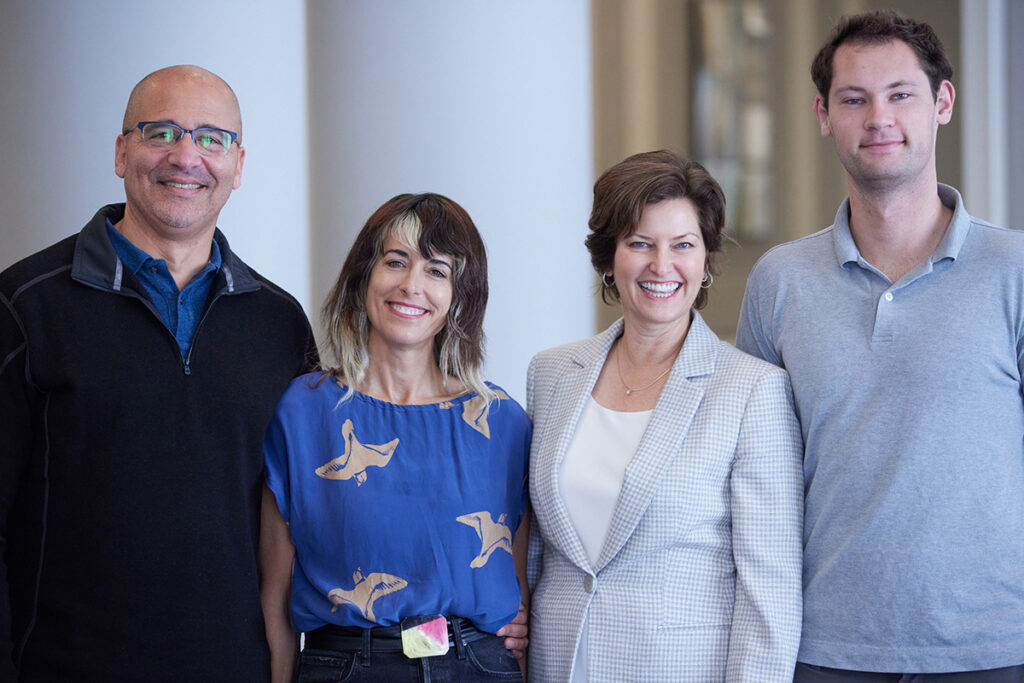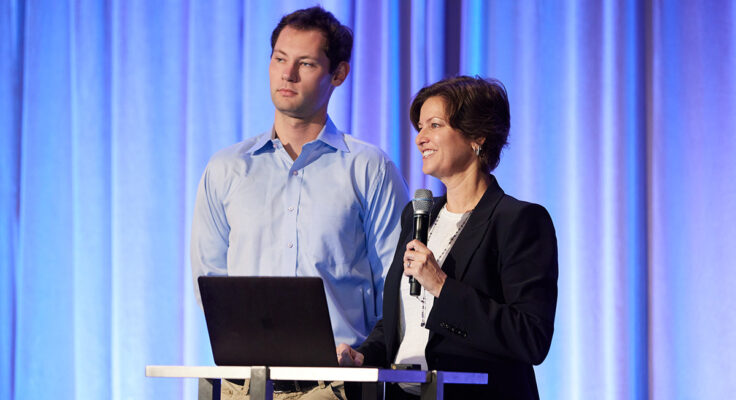The Kenneth Rainin Foundation’s Board of Directors plays an essential role in furthering our mission. Our Board profile series shares how our Board members’ experiences and perspectives contribute to our work.
Our final conversation is with Board member and CEO Jen Rainin, who is also Kenneth Rainin’s daughter. Before his death in 2007, Ken collaborated with her to establish the Foundation’s Arts, Education and Health program areas. Jen has shaped the organization’s evolution and continues to be guided by her deep connection to our mission and values. Following are highlights from our conversation.
What does leadership look like as a Board member and CEO?
My relationship with the organization is unique because of my connection to the founder. Yes, I’m the CEO and I am driven to achieve our mission. But it’s also personal; the organization feels like an extension of my family.
Many staff have heard me say, “My dad would’ve loved this.” Or “My dad would’ve hated this but we’re doing it anyway for this reason.” In some ways, I feel like the Foundation’s matriarch. When I talk about my dad, staff respond by leaning in like I’m telling a story around the fireplace. It’s a beautiful and unique experience.
How does your background inform your role as a Board member?
It’s interesting to think about the paths we take. If you looked at my resume before this Foundation came into being, you might wonder where I was going. Looking back now, I see my resume is perfect for what I am doing. I was a teacher and a literacy specialist, which I loved. I was an actor, which I loved. I was an administrator, which I loved. I am a person who has ulcerative colitis, which I don’t love but I sort of love now in a weird way. All of these things relate to my work with the Foundation today.
Being a special education teacher taught me to work with each individual in the room and meet them where they are. It also taught me performance skills—project your voice, keep everyone’s attention, modulate. You have to know when to pull people in, when to make them laugh, when to grab at their heart.
The acting skills built on that. The year my father died, I trained as a Meisner actor, which focuses on being present and engaging with others and your surroundings. It allowed me to do deep work with my emotional range and to be less afraid of my emotions. People think that acting is about pretending, but it’s really the opposite. Acting is about being truthful and open. My training has served my ability to be vulnerable and to share my heart effectively.
How has your experience with ulcerative colitis shaped you?
My dad had an enormous amount of shame around his disease, and a lot of the work I do outside of the Foundation is around reducing shame. I openly talk about having ulcerative colitis. I discuss treatments that have worked and those that haven’t worked for me and how debilitating it is when I’m flared. I always open our annual Innovation Symposium by sharing my story with the scientists. In sharing my story, I can also help the Board connect with this piece of our work. And now my son Dashiell, who is also on the Board and has ulcerative colitis, is sharing his story. There’s something powerful in seeing good come out of a painful and debilitating illness.
There’s something powerful in seeing good come out of a painful and debilitating illness.
How do you draw on the Foundation’s values of interdependence, creativity and equity?

The Foundation’s values shape how I work with the Board. I’m always trying to foster a sense of interconnectivity and we are in close contact all year long. But once a year, we come together for a two-day retreat to dive into the mission, vision, values and the work of the Foundation. At our 2023 Board retreat, we all agreed that we wanted to better express our equity value and be accountable to how the organization is addressing equity. So, over several weeks, the Board crafted a revised version of our equity value that we felt good about. That process was a beautiful example of all three of our core values at work. We were creative in how we approached the statement. We considered equity deeply, both as we define it as an organization and as we operationalize it throughout the organization. And we could only do it in deep connection with each other.
Is there anything you’d like to share about your personal diversity, equity and inclusion (DEI) journey.
At a recent staff meeting, someone asked me what the hardest thing was about getting started in DEI work. And my candid response was simply getting started. As a white woman, I have been privileged to not have to think or talk about issues around diversity and inclusion if I didn’t want to. As a queer woman, I have lived experience that has shaped my work and expanded my empathy and understanding of issues like only-ness, being the only in a meeting. And my experience living in a femme body gives me a certain level of empathy. But there are so many areas that I haven’t been as exposed to and haven’t had to think about.
When I started to focus on our DEI work, my orientation to this organization as an extension of my family enabled me to show up in vulnerable ways. When I screw up, I talk about it. Getting started on this work felt hard because I feared doing something wrong, saying something hurtful, or misunderstanding others’ experiences. And that definitely happened. I failed repeatedly and I learned every time.
A dear friend and educator defined the word “fail” as an acronym: first attempt in learning. In our work together now, staff and Board make room for each other to grow and change and learn and expand. By creating that space, failure becomes part of the process. The fear that I had has lessened. It’s about figuring out what we do when things go sideways.
Now, when someone points out that I’ve done something hurtful, I apologize. I also try to understand. And I’m grateful for the opportunity to expand my understanding of other people’s experience in the world.
In our work together now, staff and Board make room for each other to grow and change and learn and expand. By creating that space, failure becomes part of the process.
Why is it important to give Board members the opportunity to make discretionary grants?
Both the Board and staff make discretionary grants each year. We wanted to ensure that everyone in the organization experiences the joys and the challenges of making a grant. Once a year, the Board shares about their discretionary grants with staff. It’s an opportunity for staff to better understand what the Board values and how they think about grantmaking.
What do you think your father, Kenneth Rainin, would be proud of?
He would be so proud seeing his first grandchild on the Board caring about the three program areas that he cared so deeply about. My dad was philanthropic in his lifetime but not on this scale. He would be thrilled to see the reach of his endowment and how it’s improving lives. I mean, that’s the glue in our mission, right? Enhance the quality of life. His Foundation has done that and continues to do that.
My dad would be thrilled to see the reach of his endowment, and how it’s improved lives.

